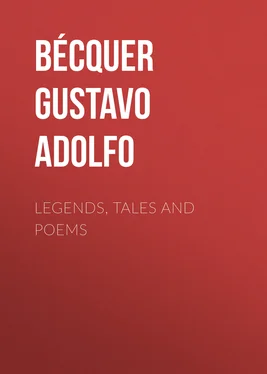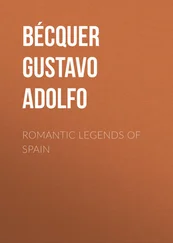Gustavo Bécquer - Legends, Tales and Poems
Здесь есть возможность читать онлайн «Gustavo Bécquer - Legends, Tales and Poems» — ознакомительный отрывок электронной книги совершенно бесплатно, а после прочтения отрывка купить полную версию. В некоторых случаях можно слушать аудио, скачать через торрент в формате fb2 и присутствует краткое содержание. Жанр: foreign_prose, literature_19, foreign_antique, на английском языке. Описание произведения, (предисловие) а так же отзывы посетителей доступны на портале библиотеки ЛибКат.
- Название:Legends, Tales and Poems
- Автор:
- Жанр:
- Год:неизвестен
- ISBN:нет данных
- Рейтинг книги:5 / 5. Голосов: 1
-
Избранное:Добавить в избранное
- Отзывы:
-
Ваша оценка:
- 100
- 1
- 2
- 3
- 4
- 5
Legends, Tales and Poems: краткое содержание, описание и аннотация
Предлагаем к чтению аннотацию, описание, краткое содержание или предисловие (зависит от того, что написал сам автор книги «Legends, Tales and Poems»). Если вы не нашли необходимую информацию о книге — напишите в комментариях, мы постараемся отыскать её.
Legends, Tales and Poems — читать онлайн ознакомительный отрывок
Ниже представлен текст книги, разбитый по страницам. Система сохранения места последней прочитанной страницы, позволяет с удобством читать онлайн бесплатно книгу «Legends, Tales and Poems», без необходимости каждый раз заново искать на чём Вы остановились. Поставьте закладку, и сможете в любой момент перейти на страницу, на которой закончили чтение.
Интервал:
Закладка:
[Footnote 1: Mrs. Ward, loc. cit. , p.319.]
[Footnote 2: Ibid. , p. 316.]
Whatever Becquer may have owed to Heine, in form or substance, he was no servile imitator. In fact, with the exception of the thirtieth, no one of his Rimas seems to be inspired directly by Heine's Intermezzo . The distinguishing note in Heine's verse is sarcasm, while that of Becquer's is pathos. Heine is the greater poet, Becquer, the profounder artist. As Blanco Garcia well points out,[1] the moral inclinations of the two poets were distinct and different also. Becquer's instinct for the supernatural freed him from Heine's skepticism and irreligion; and, though he had suffered much, he never doubted Providence.
[Footnote 1: op. cit. , p.86.]
The influence of Alfred de Musset may be felt also in Becquer's Rimas , particularly in the forty-second and forty-third; but in general, the Spanish poet is "less worldly and less ardent"[1] than the French.
[Footnote 1: Corm, op. cit. , p. xl.]
The Rimas are written for the most part in assonanced verse. A harmonious rhythm seems to be substituted for the music of the rhyme. The meter, too, is very freely handled. Notwithstanding all this, the melody of Becquer's verse is very sweet, and soon catches and charms even the foreign ear. His Rimas created a school like that inspired by the Doloras of Campoamor. But the extreme simplicity and naturalness of Becquer's expression was difficult to reproduce without falling into the commonplace, and his imitators have for the most part failed.
AN UNPUBLISHED LETTER OF THE POET BECQUER, ONE OF THE FEW THAT HAVE SURVIVED HIM, ADDRESSED TO SOR. C. FRANCO DE LA IGLESIAS, MINISTERIO DE ULTRAMAR, MADRID. DATED IN TOLEDO, JULY 18TH, 1869.[1]
[Footnote 1: The accentuation and punctuation of the original are preserved. This letter is of particular interest, showing, as it does, the tender solicitude of Becquer for his children, his dire financial straits when a loan of three or four dollars is a godsend, and his hesitation to call upon friends for aid even when in such difficulties. The letter was presented to the writer of this sketch by Don Francisco de Laiglesia, a distinguished Spanish writer and man of public life and an intimate friend of Becquer. Señor de Laiglesia is the owner of the magnificent portrait of Gustavo by Valeriano Becquer, of the beauty of which but a faint idea can be had from the copy of the etching by Maura, which serves as a frontispiece to the present volume. ]
Mi muy querido amigo:
Me volvi de esa con el cuidado de los chicos y en efecto parecia anunciarmelo apenas llegue cayó en cama el mas pequeño. Esto se prolonga mas de lo que pensamos y he escrito á Gaspar y á Valera que solo pagó la mitad del importe del cuadro Gaspar he sabido que salio ayer para Aguas Buenas y tardará en recibir mi carta Valera espero enviará ese pico pero suele gastar una calma desesperante en este apuro recurro una vez mas á vd. y aunque me duele abusar tanto de su amistad le ruego que si es posible me envie tres ó cuatro duros para esperar el envio del dinero que aguardamos el cual es seguro pero no sabemos que dia vendrá y aqui tenemos al medico en casa y atenciones que no esperan un momento.
Adios estoy aburrido de ver que esto nunca cesa. Adios mande vd. á su amigo que le quiere
Gustavo Becquer
Espresiones á Pepe Marco S/c Calle de San Ildefonso Toledo. Si le es á vd. posible enviar eso hagalo si puede en el mismo dia que reciba esta carta por que el apuro es de momento.
BIBLIOGRAPHICAL NOTE
A list of the works consulted in the preparation of the sketch of Becquer's life.
WORKS BY BECQUER
Obras de Gustavo A. Becquer. Quinta edición aumentada con varias poesías y leyendas. Madrid, Librería de Fernando Fé, 1898. Three volumes.
Historia de los Templos de España, publicada bajo la protección de SS. MM. AA. y muy reverendos señores arzobispos y obispos—dirigida por D. Juan de la Puerto Vizcaino y D. Gustavo Adolfo Becquer. Tomo I, Madrid, 1857. Imprenta y Estereotipia Española de los Señores Nieto y Campañía. Becquer is the author of only a portion of this work—see Introduction, p. xx.
La Ilustración de Madrid, January 12-October 12, 1870, contains a large number of articles by Becquer that have never been published in book form. The same can be said of other periodicals for which Becquer collaborated.
TRANSLATIONS
Gustave Becquer—Légendes espagnoles. Traduction de Achille Fouquier, dessins de S. Arcos. Paris, Librairie de Firmin-Didot et Cie, 1885 . French.
Terrible Tales—Spanish. W. W. Gibbings, London, W. C. In this collection the following seven out of the twelve tales that it contains are by Becquer,—"The Golden Bracelet," "The Green Eyes," "The Passion Flower," "The White Doe," "Maese Pérez, the Organist," "The Moonbeam," and "The Mountain of Spirits." The translation is often inaccurate.
WORKS OR ARTICLES ON BECQUER
P. Francisco Blanco Garcia. La Literatura Española en el Siglo XIX, parte segunda, Madrid, 1891 , contains a good criticism of the literary work of Becquer, pp. 79–91, and pp. 274–277.
Narciso Campillo. Gustavo Adolfo Becquer is the title of an excellent article on the Seville poet, by one who knew him well, in La Ilustración Artística , Barcelona, December 27, 1886, pp. 358–360. This number (261—Año V) is dedicated to Becquer, and contains many prose articles and much verse relative to him.
Achille Fouquier. Gustave Becquer, Légendes Espagnoles. Traduction de Achille Fouquier, dessins de S. Arcos. Paris, Firmin-Didot et Cie, 1885,—Avant-Propos , pp. 1–19. An interesting sketch of Becquer's life and an excellent appreciation of his style.
José Gestoso y Pérez. Carta á Mr. Achille Fouquier is the title of a valuable article in La Ilustración Artistica , Barcelona, December 27, 1886, pp. 363–366. This article contains important genealogical matter regarding Becquer, which had not until that time been published.
Eduardo de Lustono. Becquer is the titie of a sketch by this writer, published in Alrededor del Mundo , No. 109, July 4, 1901, pp. 11–13, and No. 110, July 11, 1901, pp. 22–23. It is largely a copy of the article by Narciso Campillo, mentioned above, and of the following by Rodriguez Correa.
Ramón Rodriguez Correa. Prólogo de las Obras de Gustavo A. Becquer. Quinta edición, Madrid, Fernando Fé, 1898 . Vol. I, pp. IX-XLV. This is the principal biography of Becquer and the source of all the others. Its author was Becquer's most intimate friend.
Juan Valera. In Florilegio de Poesías Castellanas del Siglo XIX, Tomo I, Madrid, Fernando Fé, 1902 , pp. 182–191, may be found an excellent appreciation of the poet by one of the most capable of Spanish critics and a personal friend of Becquer.
P. Restituto del Valle Ruiz, Agustino. In his Estudios Literarios , pp. 104–116, there is a chapter devoted to Gustavo A. Becquer, which contains an interesting critique of his poetry.
Mrs. (Mary A.) Humphrey Ward, in Macmillan's Magazine , No. 280, February, 1883, pp. 305–320, has an article entitled "A Spanish Romanticist: Gustavo Becquer." This is one of the best articles on Becquer that have been published.
SPANISH PROSODY
The basis for the following remarks on Spanish prosody is, for the most part, E. Benot's Prosodia Castellana y Versification , 3 vols., Madrid, 1892. Other works which have been consulted are the Ortologia y Arte Metrica of A. Bello, published in his Obras Completas , vol. 4, Madrid, 1890; Rengifo's Arte Poètica Española , Barcelona, 1759; J. D. M. Ford's "Notes on Spanish Prosody," in A Spanish Anthology , published by Silver, Burdett & Co., 1901; and a Tratado de Literatura Preceptiva , by D. Saturnino Milego é Inglada, published at Toledo in 1887.
Читать дальшеИнтервал:
Закладка:
Похожие книги на «Legends, Tales and Poems»
Представляем Вашему вниманию похожие книги на «Legends, Tales and Poems» списком для выбора. Мы отобрали схожую по названию и смыслу литературу в надежде предоставить читателям больше вариантов отыскать новые, интересные, ещё непрочитанные произведения.
Обсуждение, отзывы о книге «Legends, Tales and Poems» и просто собственные мнения читателей. Оставьте ваши комментарии, напишите, что Вы думаете о произведении, его смысле или главных героях. Укажите что конкретно понравилось, а что нет, и почему Вы так считаете.












